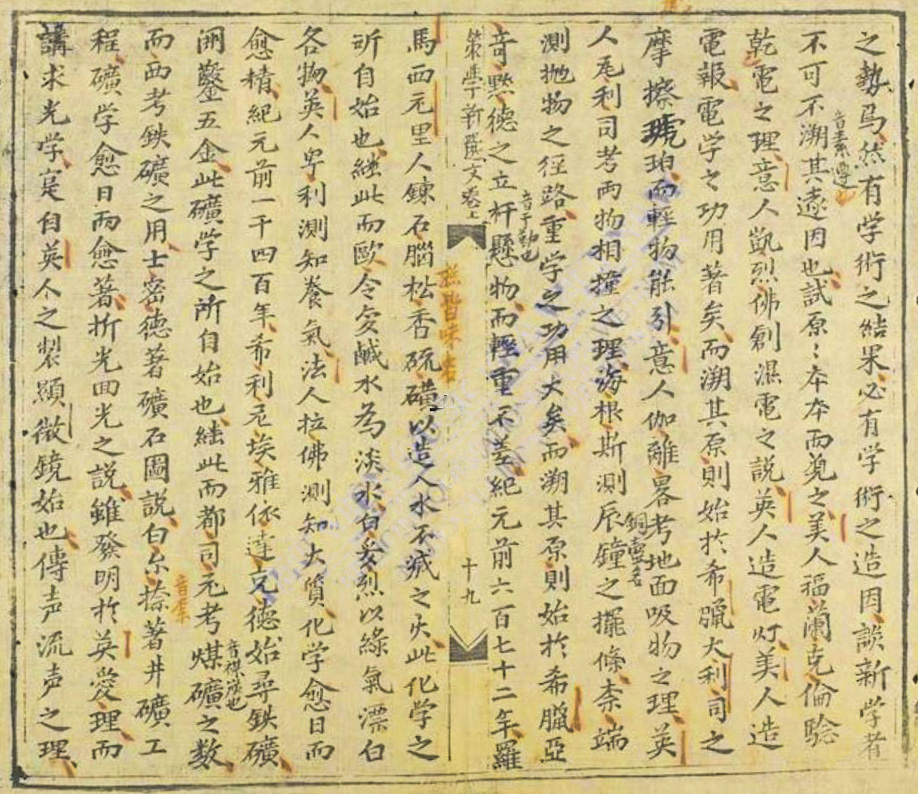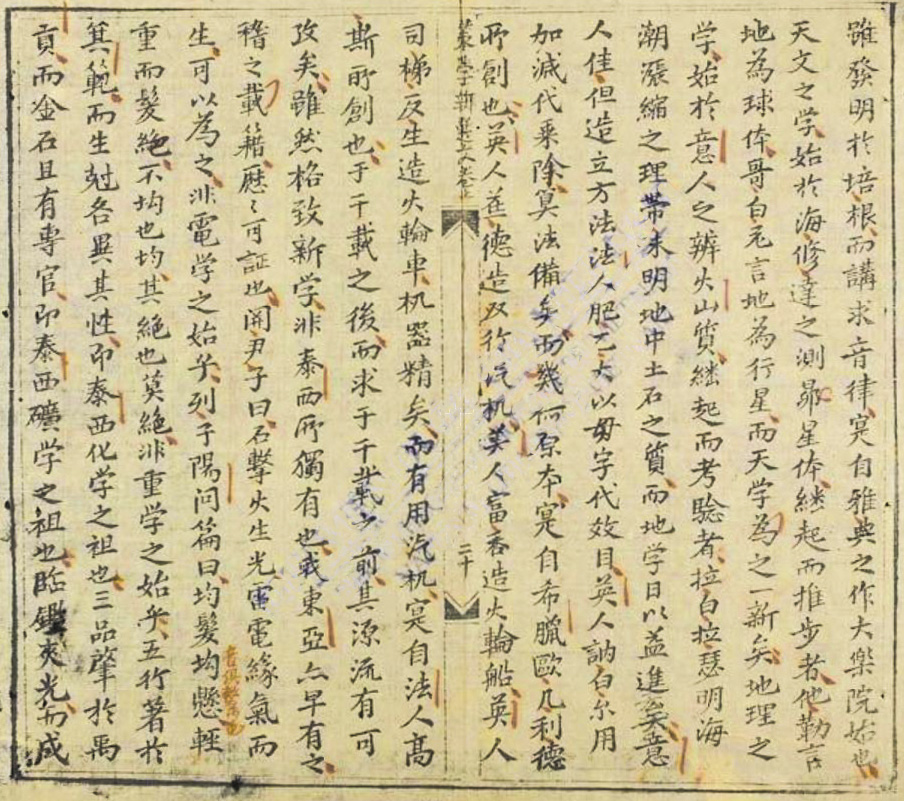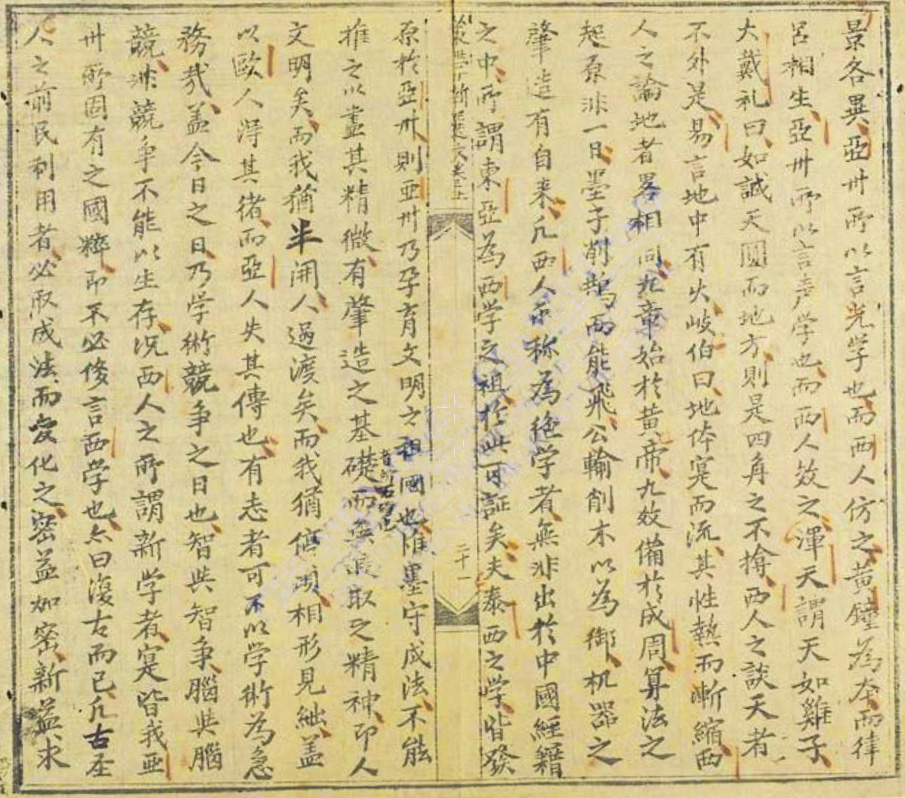In reading writings from the world of the Nguyễn Dynasty in early twentieth century Vietnam the one thing that becomes clear is that there was a lot of information available about the West at that time. So the traditional elite were not ignorant about other parts of the world.
However, there were members of the traditional elite who were reluctant to change, even though they knew about Europe and America and the developments that had taken place there in recent years.
The 1910 palace exam essay on the Yijing is a clear example of the viewpoint of people who did not want to change, as it dismissed all Western learning and reformist writings as containing nothing that was not already recorded in the (Confucian) classics.

So for reformist Nguyễn Dynasty officials like Phạm Quang Sán, the challenge was how to find a way to convince conservative members of the traditional elite that they should adopt change.
He has a question and answer in his A New Selection of Policy Studies (Sách học tân tuyển 策學新選) where he sought to do this by first agreeing with the conservative elite that the classics were the font of all knowledge. He likewise agreed with the conservative elite that Western learning has its roots in the classics. However, he then argued that Westerners had developed the original ideas in the classics, while people in Asia had failed to do that, and this is what explained the different levels of development between Asia and the West.
Phạm Quang Sán called on people to “restore ancient ways” (phục cổ 復古), by which he did not mean to go back to the classics and use those texts as guides for how to live in the present, but instead, he wanted people to follow the development of the concepts that first appeared in the classics all the way to their present Western maifestations, as only then, Phạm Quang Sán argued, would people in Asia be able to complete with the Occident for supremacy (可與泰西爭勝) in a Social Darwinist world of competition.

Here is how Phạm Quang Sán phrased his question:
泰西諸國,電學重學化學礦學光學聲學,與夫天文地理,算法機器,莫不各造其極。其源流有可攷歟。有謂中國為西學之祖,於何可證。自今視之,何以相形見絀,有志新學者,如何而可。
“[In] the various Occidental countries, the science of electricity, mechanics, chemistry, minerology, optics, acoustics as well as astronomy, geography, arithmetic and the study of machinery have all achieved the ultimate [level of development]. Can the origins [of these fields of study] be investigated? There are those who say that China is the progenitor of Western learning. What evidence is there for that? Viewing [conditions] from the present, in what way [are we] inferior by comparison? What can those who are determined [to promote] new learning do?”
Phạm Quang Sán therefore asked the four questions that we can rephrase as follows: Can the origins of Western learning be traced? Is China the progenitor of Western learning? In what way is Asia inferior to the West by comparison? What can scholars who are determined to promote new learning (which is the same as Western learning) do about the current state of affairs?

In his answer, Phạm Quang Sán demonstrated that the origins of Western learning definitely could be traced. Here, for instance, is what he had to say about the study of electricity:
泰西自十八世紀以來,文化驟進,新理日出,幾有各造其極。然有學術之結果,必有學術之造因。談所新學者,不可不溯其遠因也。試原原本本而觀之,美人福蘭課倫騐乾電之理,意人凱烈佛創濕電之說,英人造電灯,美人造電報,電學之功用著矣。而溯其原則始於希臘太利司之摩擦琥珀。
“Since the eighteenth century, culture in the Occident has progressed rapidly. Every day a new principle emerges, as if they have each achieved the ultimate. However, when there are results of scholarship then there must be origins of scholarship. As for this new learning, one must trace back its distant origins.
“To take a look at the whole story, American [Benjamin] Franklin experimented with the principle of dry electricity and Italian Galileo [Ferraris] (?) established the theory of wet electricity. An Englishman created electric lights. An American created the telegraph. The uses of the science of electricity are obvious. And in tracing its origins, they begin with Thales’ rubbing together amber [to create static electricity] in Greece [in the 6th century BC].

After tracing the origins of various fields of Western learning, Phạm Quang Sán then turns to the second question: Is China the progenitor of Western learning?
Here, like the author of the essay on the Yijing in the 1910 exam, Phạm Quang Sán points out that one can find evidence in ancient Chinese texts of all of the fields of Western learning.
To take the field of the study of electricity, for instance, Phạm Quang Sán sites the sixth century BC text the Guan Yinzi (關尹子) which says (actually, Phạm Quang Sán condenses a passage in that text) that “[when] stones are hit, fire omits light. Thunder and lightning are brought forth by causal qi, and can be produced. Is this not the beginning of the study of electricity?”
(石擊火生光,雷電緣氣而生,可以為之,非電學之始乎。)
Phạm Quang Sán then goes on to state that:
凡西人所稱絕學者,無非出於中國經籍之中。所謂東亞為西學之祖,於與可證矣。夫泰西之學,皆發原於亞洲,則亞洲乃孕育文明之祖國也。
“All of the learning that Westerners say is unique, all comes from ancient Chinese texts. The idea that East Asia is the progenitor of Western learning can therefore be proven. Occidental learning all has its source in Asia, and Asia thus is the fatherland that gave birth to civilization.”

Moving on to the third question – In what way is Asia inferior to the West? – Phạm Quang Sán argues that Asia has become inferior to the West because although Asia is the place where all knowledge was created, the West went on to develop that knowledge.
This is how he explains this:
惟墨守成法,不能推之以盡其精微,有肇造之基礎,而無進取之精神,即人文明矣,而我猶半開,人過渡矣,而我猶停頓。相形見絀,蓋以歐人得其緒,而亞人失其傳也。
“However, [people in Asia] stuck to the same ways. They were unable to push [knowledge forward] and exhaust its subtitles. They created a foundation of creation, but did not have the spirit of endeavoring to advance. So other people became civilized while we were still semi-civilized, and other people crossed [the globe] while we still stood at a standstill. Being inferior by comparison is probably because Europeans obtained a line [of knowledge transmission] and Asian lost that [line of knowledge] transmission.”

This then leads to the fourth and final question – What can scholars who are determined to promote new/Western learning do about the current state of affairs? And this is how Phạm Quang Sán responds to that question:
有志者可不以學術為急務哉。蓋今日之日,乃學術競爭之日也。智與智爭,腦與腦競,非競爭不能以生存。況西人之所謂新學者,實皆我亞洲所固有之國粹。即不必侈言西學也。今[?]曰復古而已。
“Those who are determined must view scholarship as an urgent matter. The present day is a day of scholarly competition. Knowledge is struggling with knowledge, and brains are contending with brains. If one does not compete, one will not be able to have the means to survive.
“That which Westerners call ‘new learning’ is truly our Asian long-held national essence. There is no need to call it by the fancy name of ‘Western learning.’ Let us just call it “restoring ancient ways.”

This is an absolutely fascinating document. Phạm Quang Sán’s knowledge of the West and of Western learning was incredibly thorough and deep, and he clearly wanted his compatriots to embrace that knowledge and to learn it.
However, for that to happen, he had to convince his conservative colleagues that it was ok to do this, and to do that, he tried to find a way that 1) showed that Western learning ultimately originated in China and that 2) there was a need for Vietnamese to learn about the knowledge that Westerners produced because Westerners had expanded upon the ideas in ancient East Asian texts whereas people in East Asia had not done this.
Again, what this shows is that it is not the case that the Nguyễn Dynasty elite in the early twentieth century did not know about the West. They knew a lot.
Instead, the “problem” was that there was a need to convince the more conservative members of the elite that it was ok to accept the knowledge that they had already been exposed to. And that is what Phạm Quang Sán tried to do.

This Post Has 2 Comments
The rhetoric of inferiority and civilized / un-civilized gives pause. There is such anxiety about being lesser people. I suppose that colonialism will give rise to that. But today this anxiety still remains.
I wrote something about that a long time ago, you probably already know about it.
https://www.academia.edu/3554290/Vietnam_as_a_Domain_of_Manifest_Civility_V%C4%83n_Hi%E1%BA%BFn_Chi_Bang_
But yea, I think the anxiety about being inferior is a constant throughout Vietnamese history. “Nga quoc” was supposed to be a “van hien chi bang,” but it wasn’t. “Nam Quoc” should have been a “nation” but it wasn’t. “Vietnam” should be a . . . but it isn’t, etc.
That said, in premodern times and the early twentieth century, I don’t think we can attribute this to “colonialism.” China was the model of a “van hien chi bang,” and there is no way that premodern Vietnam could compare. In the early twentieth century, Vietnamese reformist scholars also realized that there was no way that their kingdom compared with Western countries or even Japan.
The anxieties about inferiority now are more complex. Yes, colonialism plays a role, but the time that 1/2 and then all of Vietnam spent on one side of the Cold War also plays a role. I’m sure there are other factors.
Actually, what struck me about this document was the claim to superiority in stating that Western knowledge has its roots in Asia. I have my doubts that Pham Quang San actually believed that. My sense is that he wrote that way to appeal to other people, but that would appeal to people because it was a way to soften a feeling of inferiority. We see this today in the writings of Vietnamese ultra-nationalists like Ha Van Thuy and Tran Ngoc Them who essentially argue that Vietnam is the source of Asian knowledge (and Asians are superior to Westerners so. . .). The need to say that comes from a feeling of inferiority. It comes from a desire to say that Vietnam is not insignificant, but since there isn’t clear and credible evidence to make this point (How is Vietnam significant in world history?), people turn to extremist ideas.